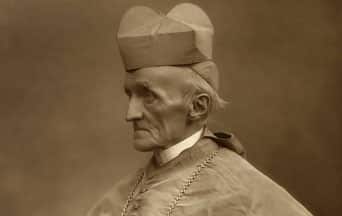
Many Catholics today are unaware of the immense contributions of the Ultramontanes of the nineteenth century to the resurgence of Catholicism worldwide. Prof. Fernando Furquim de Almeida (1913-1981) studied the Movement and produced dozens of articles detailing the Movement’s work. We have edited these articles and will be featuring them. They highlight the actions of Ultramontane leaders in England, Spain, Italy, France and Ireland.
Cardinal Nicholas Wiseman’s firm and courageous attitude yielded excellent results. His stand in opposition to the Anglican Church and the English government showed how opportune a fearless and open English apostolate was in England’s current circumstances. He not only reestablished the English hierarchy but convinced British Catholics that Cardinal Acton’s timid and conciliatory moves, and those of his supporters, were futile. Providence also used this battle to convert one of the great defenders of papal infallibility in the nineteenth century; the future Henry Edward Cardinal Manning.
From an early age, Henry Manning, son of a London banker, distinguished himself among his peers. He possessed remarkable willpower and an extraordinary capacity for action. At that time, his motto was: Aut Caesar, aut nihil.1
Manning was a friend of William Ewart Gladstone, the future prime minister, and others of his generation who would later hold important public posts. Like them, young Manning initially intended to devote himself to politics.
Eternal and Natural Law: The Foundation of Morals and Law
The loss of his father’s fortune and the influence of a fervent Protestant, Miss Favell Bevan, led him to embrace an Anglican ecclesiastical career. In 1833, Pastor Manning was entrusted with the care of Lavington parish. At the same time, he married Caroline Sergeant, one of the three sisters famous in London for their beauty. Through this marriage, he became the brother-in-law of Samuel Wilberforce. Samuel’s father, William Wilberforce, was the well-known politician who dedicated his life to the abolition of slavery worldwide. Samuel’s brother, Henry Wilberforce, participated in the Oxford Movement led by Newman, becoming one of the eminent English converts of the nineteenth century. Samuel persevered in error and died an Anglican bishop.
Although he followed the Oxford Movement’s activities with sympathy, Manning did not actively participate in it. Driven by a desire for perfection heightened by the 1837 death of his young wife, he grew closer to Newman and his friends. While the opportunity to develop his spiritual life was the Movement’s main attraction, Manning also agreed with its criticism of the Anglican Church. Manning especially objected to government interference in ecclesiastical affairs.
In 1839, Gladstone, then a “backbench” Member of Parliament, invited Manning to lunch with François Rio, a Catholic Frenchman who shared his ardent apostolate efforts between France and England. During dinner, they argued about authority in matters of religion, which continued into the late hours of the night. Manning, the “impassable Archdeacon,” as Rio called him in his memoirs, sustained that no world power would make him recognize the Pope’s authority.
Manning, therefore, did not convert along with Newman, Faber, Ward and others in 1845. He still held strong prejudices against the institution of the papacy.
 Learn All About the Prophecies of Our Lady of Good Success About Our Times
Learn All About the Prophecies of Our Lady of Good Success About Our Times
By 1850, Protestantism had lost all meaning for Manning. That year, the Crown Privy Council was called upon to settle a dispute between the ecclesiastical authorities and Pastor G. C. Gorham, who admitted that he no longer believed in the efficacy of baptism. The Privy Council ruled for Gorham, supporting him in the fight against the Anglican hierarchy.
Cardinal Wiseman’s bold attitude in facing down intolerant Protestants opposed to the re-establishment of Catholic bishoprics completely opened the eyes of the future cardinal. He went to a notary and, by a public act, renounced all the benefits he had in the Anglican Church. Then, he went to a Catholic church and prayed the Hail Mary for the first time. Shortly afterward, the Jesuit Iacobus Brownbill received his profession of the true Faith. Manning then left for Rome to complete the studies that would allow his priestly ordination. The former Anglican pastor of Lavington had become a champion of pontifical infallibility.
In 1854, the Frenchman, François Rio, met Manning again in Rome. Rio described the circumstances of the meeting in his memoirs.
Science Confirms: Angels Took the House of Our Lady of Nazareth to Loreto
“I was in Rome during Lent 1854 when Italian and foreign preachers redoubled their zeal for the conversion of souls, especially those distant from the true Faith, thanks to inherited errors. Following rumors of his conversion, an English priest, Dr. Manning, recently arrived in Rome and was to preach the next morning to a mixed audience in the chapel of the Irish College. It is not difficult to guess that I was not one of the last to go. What a surprise, and a change I saw, not only in his countenance, attire, and general appearance but also in his eyes and voice, which revealed all nuances of his interior changes! You can imagine my intense emotion when, after some preliminary explanations, the speaker announced his sermon would address the need for [papal] infallibility to enable the action of the Holy Ghost in the Church. In other words, he was going to develop from a standpoint entirely new to me, the same dogma he found entirely inadmissible when I tried to demonstrate its necessity [in 1839]. Now that I had become his humble listener, that need seemed more evident to him than it had to me. In all this audience, I almost had a right to claim a double share in his blessing as he ended his exposition. But that wasn’t enough for me. As soon as he came down from the pulpit, I waited inside the abbey and was finally able to satisfy the immense desire I’d had, for more than an hour, to shake his hand.”

